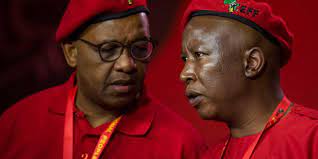Julius Malema, the fiery leader of the Economic Freedom Fighters (EFF), has dismissed concerns about the recent departures of key figures Floyd Shivambu and Dali Mpofu, insisting that their exits have had no detrimental impact on the party’s operations or its long-term stability. In a candid interview with Onkgopotse “JJ” Tabane on eNCA’s Power To Truth on Tuesday, Malema made it clear that the EFF continues to march forward undeterred, even after the resignation of its former deputy president Shivambu in August and the departure of veteran lawyer Mpofu in November. Both have since joined the MK Party, a faction aligned with former President Jacob Zuma, citing a shared commitment to the values and interests of the people.
According to Malema, the loss of these prominent figures has not created a leadership vacuum within the EFF, and he was quick to scoff at the notion that their absence would be felt. “Did you feel anything about it?” he asked during the interview. “Did you feel like something is missing because so and so is not there? This animal is bigger than individuals.” The EFF leader emphasized that the party’s strength lies not in any single person, but in the collective force of its membership, which he believes is unshaken by the departure of two of its founding members.
Malema didn’t mince words when reflecting on the contributions of Shivambu and Mpofu during their tenure. He described their actions as a “direct betrayal” of the party’s mission, a sentiment he reinforced when asked how he would summarize their time in the EFF for a book. “The chapter would be called ‘The Two Betrayers,'” he said bluntly. For Malema, their 10 to 11 years of involvement amounted to little more than a false commitment to the party’s cause, as he insists their loyalty was always conditional, easily forsaken for personal or ideological differences.
In the interview, Malema rejected any attempts to credit individual achievements within the party. The EFF, he argued, was not the product of a single person but a collective endeavor. “The idea of individuals dwindles into insignificance once a collective decision is taken,” he said. “Whatever 11 years you want to talk about cannot be attributed to any individual.” For Malema, this was a pointed reminder that the EFF, founded on the principles of radical economic transformation and social justice, is not defined by any one leader or member. It is the result of a shared vision, continuously shaped by the party’s base and leadership as a whole.
Despite the party’s humbling electoral defeat in May, which remains a significant blow to the EFF’s ambitions, Malema remains defiant and optimistic. The loss, while notable, has not shaken his confidence in the EFF’s future. He believes the party remains on course and that its vision, far from being weakened by the departures of two high-profile members, is as resolute as ever. In his view, the EFF is not just surviving; it is thriving, with its focus firmly on the future and on the broader struggle for economic freedom in South Africa.
The impact of Shivambu and Mpofu’s exit will likely continue to reverberate within the party’s corridors, but for Malema, the narrative is clear: the EFF is much more than the sum of its parts, and its long-term success will hinge not on the presence of a few individuals, but on the unity and determination of its collective leadership and membership.
